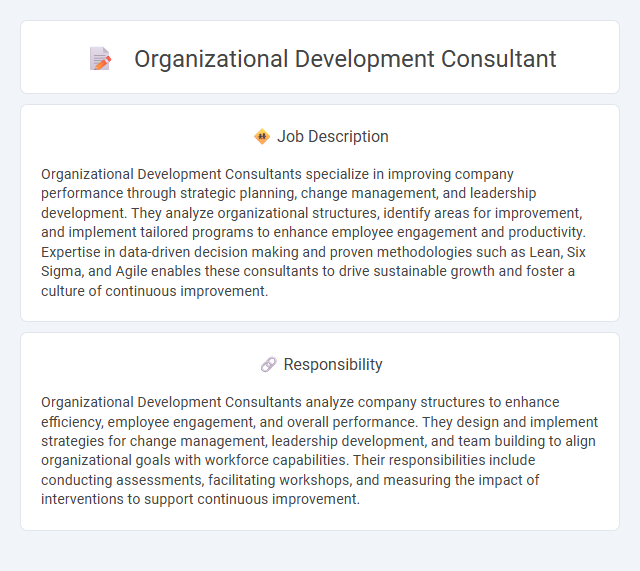
Organizational Development Consultants specialize in improving company performance through strategic planning, change management, and leadership development. They analyze organizational structures, identify areas for improvement, and implement tailored programs to enhance employee engagement and productivity. Expertise in data-driven decision making and proven methodologies such as Lean, Six Sigma, and Agile enables these consultants to drive sustainable growth and foster a culture of continuous improvement.
Individuals with strong interpersonal skills and a passion for driving change are likely to thrive as Organizational Development Consultants. Those who adapt well to dynamic environments and possess a keen interest in human behavior and business strategy may find this role suitable. The probability of success increases for candidates who demonstrate empathy, analytical thinking, and the ability to influence organizational culture.
Qualification
An Organizational Development Consultant typically holds a bachelor's or master's degree in psychology, business administration, human resources, or a related field, with certifications such as Prosci or SHRM enhancing their expertise. Proven experience in change management, strategic planning, and employee development is essential to effectively analyze and improve organizational structures. Strong interpersonal, analytical, and communication skills are crucial for collaborating with leadership teams and facilitating successful organizational transformations.
Responsibility
Organizational Development Consultants analyze company structures to enhance efficiency, employee engagement, and overall performance. They design and implement strategies for change management, leadership development, and team building to align organizational goals with workforce capabilities. Their responsibilities include conducting assessments, facilitating workshops, and measuring the impact of interventions to support continuous improvement.
Benefit
Hiring an Organizational Development Consultant likely enhances a company's ability to improve internal processes and employee engagement effectively. This role probably contributes to identifying growth opportunities and resolving workplace challenges, leading to increased productivity and a more positive organizational culture. Companies may also experience better adaptability to market changes by leveraging expert guidance in strategic planning and change management.
Challenge
Organizational Development Consultants likely face the challenge of navigating resistance to change within established company cultures. They probably encounter difficulties in aligning diverse stakeholder interests while implementing strategic transformation initiatives. Effectively diagnosing organizational issues and securing buy-in for sustainable development may also present significant challenges in their role.
Career Advancement
Organizational Development Consultants play a crucial role in enhancing workplace efficiency by implementing strategic change management and employee training programs, which significantly contribute to career advancement opportunities. Their expertise in diagnosing organizational challenges and designing tailored development plans positions them for leadership roles such as Senior Consultant or Director of Organizational Development. Mastery of data analytics, HR technologies, and strong interpersonal skills further accelerates progression within industries like healthcare, finance, and technology.
 kuljobs.com
kuljobs.com